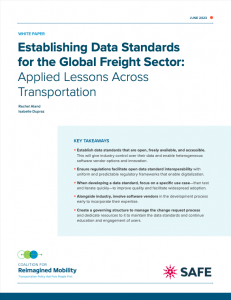Establishing Data Standards for the Global Freight Sector: Applied Lessons Across Transportation
Rachel Aland, Isabelle Dupraz
June 21, 2023
This white paper, titled Establishing Data Standards for the Global Freight Sector: Applied Lessons Across Transportation, outlines the best practices for the development, adoption, and management of data standards across the global freight sector from real world examples across the transit, maritime shipping and aviation industries.
The paper highlights the success of data standards in these transportation industries and the insights and lessons learned that can be applied across the global freight sector. Specifically, with case study insights how to:
- Establish data standards that are open, freely available, and accessible.
- Focus on a specific use case, then test and iterate quickly when developing a data standard, to improve quality and facilitate widespread adoption.
- Involve software vendors in the development process early to incorporate their expertise.
- Create a governing structure and dedicate resources to maintain the data standards and continue education and engagement of users.
- Ensure regulations facilitate open data standard interoperability with uniform and predictable regulatory frameworks that enable digitalization.
Building on ReMo’s 2022 freight report, “Solving the Global Supply Chain Crisis with Data Sharing” and the subsequent issue brief, ““The Importance of Data Standards and Interoperability in Global Supply Chains,” this white paper aims to help inform policymakers and industry stakeholders in the freight sector and beyond of the best practices for adopting modern data standards that will make the freight sector more efficient, resilient, and sustainable.

